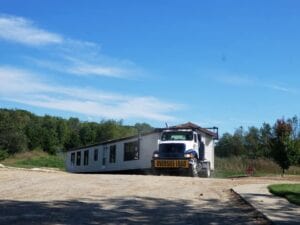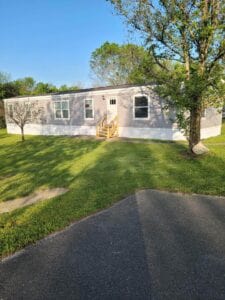Are you considering the idea of putting a mobile home in your backyard? It’s a way to save money on housing and enjoy the nature well. However, before you start construction, it’s important to look into local regulations and zoning laws. In Montana, for example, there are plenty of plots of land where you can legally place a mobile home.
Can I Put a Mobile Home in My Backyard

But what about your own backyard? The answer is not so straightforward. Depending on where you live, there may be restrictions on placing a mobile home in your backyard. To find out if it’s possible, you’ll need to look into local regulations and zoning laws.
If you’re considering this option, keep reading for more information about backyard mobile homes and how to navigate the process. We’ll cover everything from construction to placement and provide helpful tips along the way.
Legal Considerations for Placing a Mobile Home on Personal Property
If you are considering placing a mobile home in your backyard, there are several legal considerations that you need to keep in mind. The laws regarding the placement of a mobile home on personal property vary by state and local regulations. So, it is important to be aware of these requirements before making any decisions.
Legal Requirements
The first thing to consider when placing a mobile home on personal property is the legal requirements that must be met. Depending on where you live, there may be specific zoning laws or building codes that apply. These regulations may dictate the size, placement, and construction of the mobile home.
To ensure compliance with all applicable laws and regulations, it is essential to consult with a lawyer or real estate professional. They can advise you on what permits and approvals may be required.
Real Property Value
Another important consideration when placing a mobile home in your backyard is how this will affect the value of your real property. In some cases, adding a mobile home to your property can increase its value as it provides additional living space. However, in other cases, it may lower the value. If the mobile home does not fit well with surrounding properties or if it negatively impacts their views.

Before installing a mobile home on your property, consider whether this will improve or detract from its overall value. You should also check with local real estate agents to see how similar properties have been valued in your area.
Property Deeds and Zoning Laws
In addition to legal requirements and property value considerations, you must also take into account any restrictions imposed by property deeds or zoning laws. Some deeds prohibit certain types of structures from being built on personal property while others restrict how close they can be placed to neighboring properties.
Similarly, zoning laws may limit where you can place a mobile home based on factors such as lot size and proximity to other buildings or roads. Understanding these restrictions before proceeding with a mobile home installation can help you avoid potential legal issues down the line.
Personal Property vs. Real Estate
One final consideration when placing a mobile home on personal property is whether it will be considered personal property or real estate. If the mobile home is permanently affixed to the land, it may be treated as real estate. This would make it subject to property taxes in addition to other fees and assessments.
However, if the mobile home is not permanently affixed, it may be classified as personal property and subject to different tax laws. Understanding how your mobile home will be classified can help you plan for any additional expenses that may arise.

Zoning Regulations and Restrictions for Mobile Homes
If you’re considering placing a mobile home in your backyard there are things to consider. It’s important to understand the zoning regulations and restrictions that may apply. These rules can vary by location and impact whether or not you’re allowed to place a mobile home on private property.
Zoning Regulations for Mobile Homes
Zoning regulations are laws that govern land use within specific areas. They’re designed to ensure that different types of properties, such as residential, commercial, and industrial, are located appropriately. This means that there may be specific zones designated for mobile homes or manufactured housing.
Mobile homes may be subject to different zoning rules than traditional housing. For example, they may be restricted to certain areas or designated mobile home parks. In some cases, local laws may require that a mobile home is placed on a permanent foundation. They also may have to meet certain size requirements.
Restrictive Covenants
Restrictive covenants are legal agreements between property owners that restrict the use of land in certain ways. Some areas have restrictive covenants that prohibit mobile homes from being placed on private property altogether.
Before purchasing a piece of land with the intention of placing a mobile home on it, it’s crucial to review any restrictive covenants that may apply. Violating these agreements can result in legal action being taken against you.
Building Permits
Building permits are required for many types of construction projects, including the placement of mobile homes in backyards. The specific requirements for obtaining a building permit can vary depending on local laws and regulations.
In some cases, building permits may only be issued if certain conditions are met. For example, you may need to provide proof that the site has access to utilities such as water and electricity. These may need to be present before being granted permission to place a mobile home there.
State Regulations
State regulations can also impact whether or not you’re able to place a mobile home in your backyard. Requirements for permits and adherence to building codes can vary by state, so it’s important to research the laws in your area before making any plans.
For example, some states require that mobile homes meet certain safety standards or have a specific number of exits. Others may require that the home be inspected before it can be occupied.
You might be interested in our article: Tiny Home For Sale in Texas
Public Utility Access for Mobile Homes
Mobile homes have become increasingly popular over the years due to their affordability and flexibility. One of the biggest advantages of a mobile home is that it can be placed in various locations, including your backyard. However, before you decide to place a mobile home in your backyard, there are several things you need to consider. One of the most crucial aspects is public utility access.
Mobile homes require access to public utilities such as water, gas, and electricity.
Before placing a mobile home in your backyard, you need to ensure that it has access to public utilities such as water, gas, and electricity. These utilities are necessary for the basic functioning of any home. Some mobile homes come with built-in tanks for water storage or propane tanks for heating purposes. They still need permanent access to public utilities however.
It is important to ensure that the mobile home has permanent access to public utilities before placing it in the backyard.
When considering whether or not you can put a mobile home in your backyard, one of the first things you should check is if there is permanent access to public utilities. If there isn’t any existing infrastructure available on your property for these services, then you might have difficulty installing them yourself. In this case, it’s best to consult with local service providers or contractors. They specialize in installing these types of services.
Homeowners Should check with their Local Government: Mobile Home Backyard
This will help to determine if there are any zoning or permit requirements for installing a mobile home in their backyard.
Another critical aspect when considering putting a mobile home in your backyard is checking local zoning laws and regulations regarding land use and building codes. You may require permits from your local government authorities before proceeding with installation work on your property. Some areas may prohibit placing a mobile home on residential properties altogether while others may allow them under specific conditions only.
To avoid legal issues down the road, homeowners must do their research beforehand. By contacting relevant authorities such as the zoning board or building department in their area. They can provide you with information on what permits and regulations are necessary for installing a mobile home in your backyard.
Water and Septic System Requirements for Mobile Homes
Mobile homes are a popular housing option, especially for those who prefer a more affordable and flexible lifestyle. However, before placing a mobile home in your backyard, it’s essential to understand the water and septic system requirements.
Wastewater Disposal: Septic System or Public Sewage System
One of the critical requirements for mobile homes is wastewater disposal. Mobile homes require a septic system or connection to a public sewage system for wastewater disposal. A septic system is an underground wastewater treatment structure that separates solid waste from water and breaks down organic matter using natural processes.

The size of the septic tank needed for a mobile home depends on the number of bedrooms and occupants. The larger the household, the bigger the tank required. For example, a two-bedroom mobile home with four occupants will need at least a 1,000-gallon septic tank.
It’s important to note that if you live in an area where public sewage systems are available, connecting your mobile home to one might be more cost-effective than installing your own septic system.
Reliable Source of Water
Mobile homes also require a reliable source of water. There are two options: connection to a public water supply or drilling your private well.
If you choose to connect your mobile home to a public water supply, ensure that you check with your local authority regarding any permits required before installation. Consider factors such as distance from the mainline and elevation changes when determining how much it will cost.
Drilling your own well can be more affordable in the long run but requires careful consideration before installation. You should hire professionals who have experience with drilling wells. They typically know what type of soil composition is best suited for drilling wells in specific areas.
Maintenance Requirements
Maintenance is crucial. For instance, regular maintenance of your septic system is necessary to prevent clogging, backups, and other issues. These issues can lead to costly repairs. Schedule regular inspections and pumping of the septic tank every three to five years or as recommended by a professional.
Ensure that you keep all hazardous materials away from your septic system because they can cause damage and even contaminate the groundwater supply.
Similarly, it’s essential to maintain your water source to avoid contamination. If you have a private well, schedule regular testing for bacteria and other contaminants. Ensure that any potential sources of contamination are kept away from the wellhead.
Advantages and Disadvantages of Living in a Mobile Home on Personal Property
If you’re thinking about whether or not you can put a mobile home in your backyard, there are advantages and disadvantages to consider. Living in a mobile home on personal property has its perks, but it also comes with some downsides.
Advantages: Affordability, Flexibility, and Mobility
One major advantage of living in a mobile home is affordability. Compared to traditional homes, mobile homes are significantly less expensive. They offer an affordable option for people who want to own their own property without breaking the bank.
Another advantage of living in a mobile home is flexibility. Because they’re designed to be easily moved from one location to another, you have the freedom to take your home with you if you need or want to move. This mobility can be especially appealing if you like the idea of being able to travel while still having your own space.
Finally, living in a mobile home can give you more mobility. With fewer zoning restrictions than traditional homes, it may be easier for you to find land that’s suitable for your needs.
Disadvantages: Depreciation, Limited Space, and Zoning Restrictions
One disadvantage of living in a mobile home is depreciation. Unlike traditional homes that typically appreciate over time, mobile homes tend to lose value as they age. This means that if you ever decide to sell your home down the line, it may not be worth as much as when you first purchased it.
Another potential downside of living in a mobile home is limited space. While they can be designed with all the necessary amenities for comfortable living, they generally have less square footage than traditional homes. This limited space may make it more challenging for families with children or pets who need room to play.
Finally, zoning restrictions can pose challenges when trying to place a mobile home on personal property. Depending on where you live, there may be zoning regulations that prohibit mobile homes from being placed on certain types of land. It’s essential to research local zoning laws before purchasing a mobile home to ensure that you can legally place it on your property.
Factors to Consider When Purchasing Land for a Mobile Home Installation
If you’re considering putting a mobile home in your backyard, there are several factors you need to consider before purchasing the land. From ensuring that the soil quality can support the foundation of the mobile home to checking if there is access to electricity, here are some essential considerations when buying vacant land for mobile home installation.
Size and Shape of the Land
Before purchasing any land, it’s crucial to determine whether it can accommodate your mobile home installation. The size and shape of the land should be considered carefully since they will impact how much space you have for living and outdoor activities. If you plan on having a garden or yard area, ensure that there is enough space for it as well.
If you’re not sure about how much space you need, consult with an expert who can help guide you through this process. Also, check local zoning laws and regulations regarding minimum lot sizes for mobile homes.
Soil Quality
The soil quality is another critical factor that needs consideration before installing a mobile home. Check if the soil is stable enough to support the foundation of your mobile home without shifting or sinking over time. You may need to hire a professional geotechnical engineer to assess soil conditions and provide recommendations on how best to prepare your site.
Access To Electricity
Having access to electricity is essential for safety during installation and convenience once installed. Ensure that there is access to power lines near your property so that you don’t have any problems getting connected once your mobile home has been installed.
Foundation Needs
Mobile homes require specific foundations depending on their size and weight; therefore, ensure that know what type of foundation system will work best for your needs before purchasing any land. Some popular options include concrete slab foundations or pier-and-beam systems.
Once again, consult with experts who specialize in installing foundations for mobile homes since they’ll be able to recommend which option is best suited for your needs.
Cost
Before purchasing any land, it’s important to determine how much you can afford and what the total costs of installation will be. Consider not only the purchase price of the land but also any additional expenses such as permits, site preparation, foundation installation, and utility connections.
Make sure that you have a clear understanding of all the costs involved before making any financial commitments.
Financing Options for Mobile Homes
If you’re considering putting a mobile home in your backyard, one of the most important things to consider is how to finance it. Mobile homes can be financed through personal loans, FHA loans, or chattel mortgages. Here are some financing options to consider:
Personal Loans
Personal loans are a common way to finance a mobile home purchase. These types of loans are typically unsecured and have higher interest rates than traditional home mortgages. However, they may be easier to obtain if you have good credit.
FHA Loans
FHA loans are another option for financing a mobile home purchase. These loans are backed by the Federal Housing Administration and offer lower down payments and more lenient credit requirements than traditional home mortgages. However, they do require mortgage insurance premiums.
Chattel Mortgages
A chattel mortgage is a type of loan that is specifically designed for mobile homes. This type of loan is secured by the home itself rather than the land it sits on. Chattel mortgages tend to have higher interest rates than other types of loans.
Rent-to-Own Options
Rent-to-own options can be a good choice if you’re not ready to commit to purchasing a mobile home outright. With rent-to-own options, renters pay monthly rent with an additional amount going towards eventually owning the home. This can give renters time to improve their credit or save up for a down payment while still having the security of knowing they’ll eventually own their own home.
Manufacturer Financing Options
Some mobile home manufacturers offer financing options for their homes. These options may include low down payments and competitive interest rates, but it’s important to read all terms and conditions carefully before committing to any financing agreement.
It’s important to shop around and compare financing options before committing to a loan. Interest rates for mobile homes tend to be higher than traditional home loans, so finding the best rate possible can save you thousands of dollars over the life of the loan.
In addition to interest rates, it’s important to consider other factors such as down payment requirements, repayment terms, and any fees associated with the loan. You should also make sure you understand all of your obligations under the loan agreement before signing on the dotted line.
Read more on our article: Mobile Manufactured Home Loans.
Is Placing a Mobile Home in Your Backyard the Right Choice for You?
In conclusion, placing a mobile home in your backyard is a viable option if you consider the legal considerations, zoning regulations, public utility access, water and septic system requirements, advantages and disadvantages of living in a mobile home on personal property, factors to consider when purchasing land for installation, and financing options. However, before making any decisions, it is crucial to do thorough research and seek professional advice.
Read more on our article: How Much Does it Cost to Prepare a Mobile Home for Land.
If you are considering placing a mobile home in your backyard, here are some FAQs that can help influence your purchase decision:
Can I Put a Mobile Home in My Backyard: FAQs
FAQ 1: Do I need a permit to place a mobile home in my backyard?
Yes. You will need to obtain the necessary permits from your local government before installing a mobile home on your property.
FAQ 2: What are the zoning regulations for placing a mobile home in my backyard?
Zoning regulations vary by location. It is important to check with your local government to determine if placing a mobile home in your backyard is allowed and what restrictions may apply.
FAQ 3: Can I connect my mobile home to public utilities?
It depends on the availability of public utilities in your area. Contact your local utility company to find out if they offer services for mobile homes.
FAQ 4: What type of water and septic system do I need for my mobile home?
The type of water and septic system required will depend on various factors such as the size of your household and location. Consult with professionals such as plumbers or contractors who specialize in installing systems for mobile homes.
FAQ 5: What are some advantages of living in a mobile home on personal property?
Some advantages include affordability, flexibility, lower maintenance costs, and the ability to customize the interior design.
FAQ 6: What are some disadvantages of living in a mobile home on personal property?
Some disadvantages include limited space, potential for depreciation in value, and difficulty with financing.
FAQ 7: What factors should I consider when purchasing land for a mobile home installation?
Factors to consider include zoning regulations, access to public utilities, proximity to amenities such as schools and shopping centers, and the condition of the land.
FAQ 8: What are my financing options for purchasing a mobile home?
Financing options include personal loans, manufactured home loans, and FHA loans. It is important to research and compare different options before making a decision.
FAQ 9: Can I rent out my mobile home if I decide not to live in it?
It depends on the location and zoning regulations. Some areas may allow renting out mobile homes while others may have restrictions. Check with your local government for more information.
Remember that placing a mobile home in your backyard can be a significant investment. It is crucial to do thorough research, seek professional advice, and weigh the pros and cons before making any decisions.
Read our articles on:
